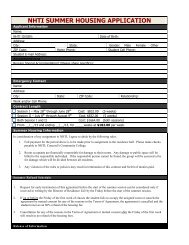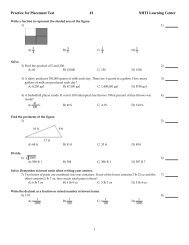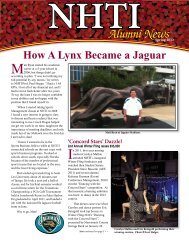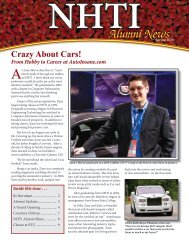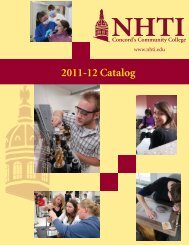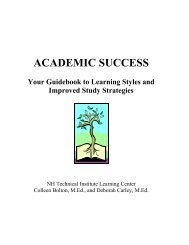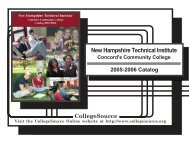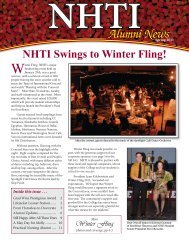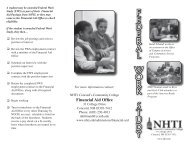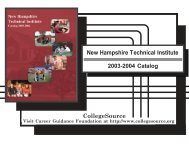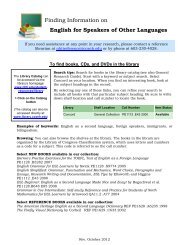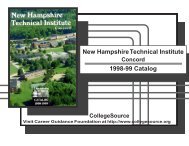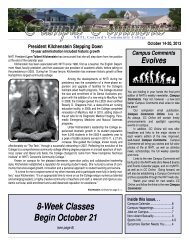Course Descriptions 11-12 - NHTI - Concord's Community College
Course Descriptions 11-12 - NHTI - Concord's Community College
Course Descriptions 11-12 - NHTI - Concord's Community College
- No tags were found...
Create successful ePaper yourself
Turn your PDF publications into a flip-book with our unique Google optimized e-Paper software.
Real EstateRE 101 Fundamentals of Real Estate 3-0-3Fundamentals course in real estate in preparation for thelicensing exam. The course meets the statutory requirementsof the New Hampshire Real Estate Commission forsalesperson examinations. Topics discussed include: listing,NH rules and regulations, types of interest in real estate, realestate taxes, liens, financing, appraising, closing statements,etc.RE <strong>12</strong>7 Introduction to Real Estate Appraisal 3-0-3This course is an examination of the principles and conceptsof real estate valuation. Students will develop anunderstanding of the markets in which buyers and sellersinteract. Topics include basic appraisal methodology, thethree approaches to value - direct sales comparison, cost,and income. The concept of highest and best use will beexamined.RE 224 Real Estate Finance and Investment 3-0-3This course will develop an understanding of the nature andcycle of real estate finance, investment and taxation. Topicsinclude: money and the monetary system; governmentactivities in real estate finance; the secondary mortgagemarket; sources of funds; fiduciaries and semi-fiduciaries; thelegal, financial and tax implications of real estate investmentand investment criteria; and instruments. (Pre/co-requisite:RE 101 or permission of department head of BusinessAdministration)RE 225 Property Management 3-0-3An examination of the growing profession of PropertyManagement within the real estate industry, including theeconomics and performance objectives of the propertymanager. Differences in residential versus commercialmanagement, shopping centers, office buildings, condos,mobile homes, resorts, hotels, etc., will be discussed.(Prerequisite: RE 101 or permission of department head ofBusiness Administration)Readingof the universe. Past and current contributions of the spaceprogram are examined. The lab component consists offrequent outdoor observations, use of telescopes andscheduled trips to astronomical sites and planetariums.SC 107 Introduction to Meteorology 3-2-4This course is an introduction to the fundamentals ofweather and climate. Topics include observing weather,physical properties and processes of the atmosphere,weather systems, hazardous weather (thunderstorms,tornadoes, and hurricanes), basics of forecasting, clouds, airpollution, and climate change. The lab component consists ofgroup exercises, hands-on experiments, and use of theInternet to explore the topics of weather. This courserequires regular student access to the Internet.SC <strong>11</strong>0 Alternative Energy Fundamentals 3-2-4Energy systems play a critical role in everyday life. This labbasedcourse will serve as an introduction to alternativeenergy systems. Students will study key concepts,terminology, and definitions used by all energy systems, aswell as typical energy consumption patterns and theirenvironmental and economic consequences. In addition,alternative energy sources will be studied along with theirbenefits and challenges. Laboratory exercises will includepower and energy measurements, power conversions, andinvestigations into various energy sources such as wood, biofuels,wind, solar, water, and fuel cells. (High school Algebra Irecommended.)SociologySO 105 Introduction to Sociology 3-0-3An introductory study of the concepts, principles, andapplications of the social science method in general and ofsociology in particular. A review of some of the crucialsociological problems of today, involving the relationship ofthe individual to society and groups of individuals to oneanother. Some topics included are culture, race, class, socialmobility, and social change. Reference is made to thehistorical and economic forces in the U.S. that areresponsible for some of these problems. Available in Honorsformat.RDNG 100 Critical Reading 3-0-3Students will use active reading strategies to comprehendand retain both literal and implied meaning in collegecontent areas and other genres. <strong>Course</strong> emphasizes criticalthinking, vocabulary development, and confidence building.Students may enroll in this course only in consultation withan academic advisor who recommends the course based onassessment test scores. The three institutional creditsawarded for this course do not count toward graduationrequirements but are calculated into GPA.ScienceSC 104 Astronomy and Space 3-2-4An introductory course designed to acquaint students withthe complexities of the universe. Topics covered include:stars and planets, nebulae, galaxies, black holes and originsSO 205 The Individual and Society 3-0-3This course examines the relationship between individualsand their social context. Specific emphasis is on the socialexperience stemming from an individual's participation insocial groups, interactions with others, and the emergence ofsocial structures from these interactions. From thisperspective, several major theories are discussed such associalization, identities and the self in social construction,attitudes and attitude change, social perception, social orderand conformity, language and social communication, andsocial behavior in groups. (Prerequisite: SO 105 or PY 105 orpermission of the instructor)SO 214 Race and Ethnic Relations 3-0-3This course will examine social and historical experiences ofthe major minority groups in order to better understandtheir social, cultural, and economic status, and grouprelations in the United States. Contemporary topics will8/17/20<strong>11</strong> <strong>NHTI</strong>, Concord’s <strong>Community</strong> <strong>College</strong> <strong>Course</strong> <strong>Descriptions</strong> 20<strong>11</strong>-20<strong>12</strong> 55



